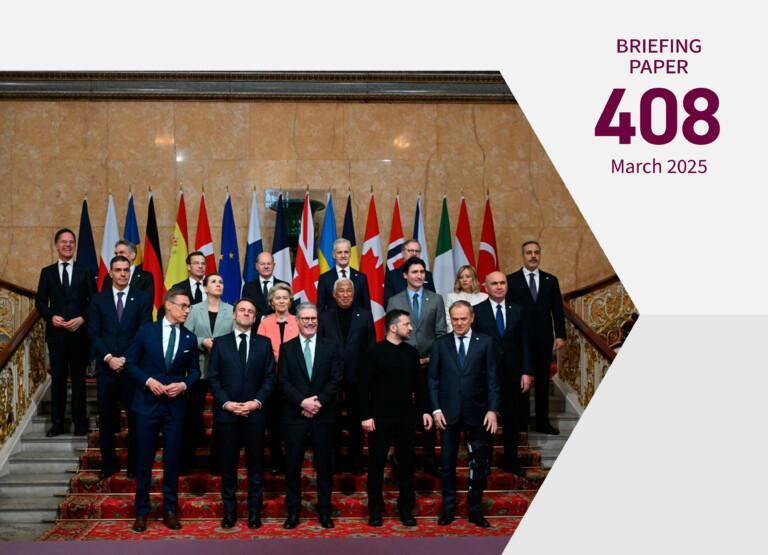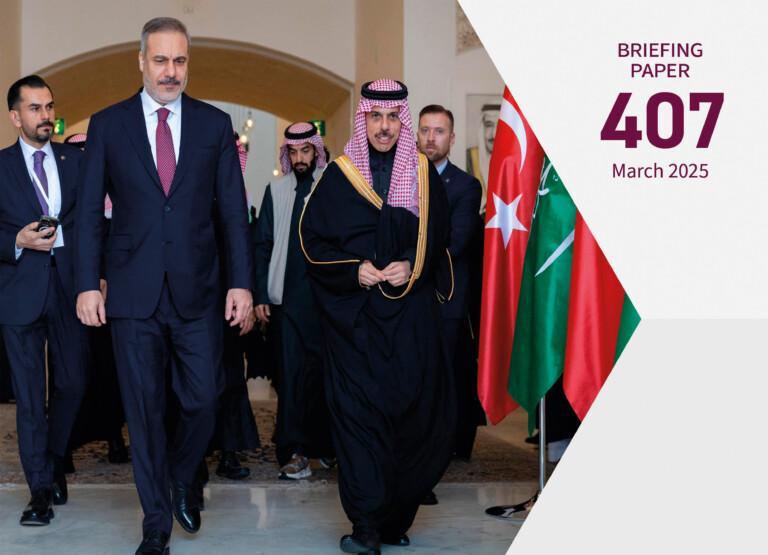
Euroopan unionin talous- ja finanssipoliittiset uudistukset ovat lisänneet EU:n ja sen jäsenmaiden toimivallanjaon hajanaisuutta. Uudistukset ovat vaikuttaneet myös siihen, kuinka Euroopan- ja toisaalta kansallisen tason toimijat käyttävät näitä toimivaltuuksia.
Lisäksi euroalueen ja muun EU:n velvoitteet ovat eriytyneet. Tämä on johtanut siihen, että vallankäyttö pirstaloituu jopa EU-instituutioiden sisällä. Toimivaltuuksien ja instituutioiden hajanaisuus vaikeuttaa talous- ja finanssipolitiikan demokraattista valvontaa.
Suurin haaste on, kuinka sisällyttää euromaiden ja muiden EU-maiden erilaiset vastuut nykyisiin EU-instituutioihin siten, että instituutioiden yhtenäisyys säilyy. Lisäksi pitää varmistaa, että EU:n talous- ja finanssipoliittisilla valtuuksilla on demokraattinen perusta.
The EU’s policies during the economic and financial crisis have affected the Union’s institutional setting in numerous ways. The European Council, which had just become institutionalised in the Lisbon Treaty, has been strengthened as the key executive body in charge of the strategic leadership of the EU’s economic and financial policy. The other executive body, the Commission, has not been weakened, however, as many of the measures adopted in the form of secondary legislation such as the new more stringent control and surveillance of national budgets or the Macroeconomic Imbalances Procedure (MIP) actually extend the Commission’s mandate. Another EU institution that has had its job description broadened is the European Central Bank (ECB), which has gained a number of new functions, making its current mandate much more heterogeneous in comparison with its initial prerogative as the guardian of price stability.
A debate on the long-term development of the Economic and Monetary Union has been ongoing since 2012 when the project entitled ‘Towards a Genuine Economic and Monetary Union’ was introduced to the European Council by the President, Herman van Rompuy. Since then, both the Commission and the European Parliament, as well as several groups of member states, have provided their views on the agenda.1 Some parts of the reform project have already secured implementation, such as the first parts of the Banking Union establishing the Single Supervisory Mechanism, whilst on many other issues a consensus has yet to emerge and an appropriate path for moving ahead remains to be identified.
This briefing paper focuses on the implications that the choices made in the long-term development of the EMU will have for the EU’s institutional setting. One of the new ideas discussed in this context is the establishment of an EU Treasury for the management of the Union’s broadened economic and financial mandate. Where would such a powerful body be placed and how would it affect the overall institutional set-up? If pressures again increase towards a further institutionalisation of the Eurogroup, how would this affect the Council and the institutional system in general?
The question is a topical one as many proposals have been made that would have this consequence, extending all from the establishment of a joint budget for the eurozone countries to the formalisation of the Eurogroup composition also in council formats other than the current ones between finance ministers and heads of government (Euro Summits). How well is the unity of the institutional framework likely to bear the pressures of differentiated integration?
Executive powers
The management of the economic and financial crisis has at the general level been seen to strengthen the intergovernmental structures of the EU’s political system – and even create new ones such as the ESM (European Stability Mechanism) – at the expense of the communitarian mode of decision-making. At least in the early stages of the crisis the strong leadership of the European Council seemed to circumscribe the Commission’s right to initiate new legislation. Step by step the situation has changed, however, not least due to the Commission’s own activism and agenda when implementing the strategic guidelines of the European Council. Most of the amendments made to the EU’s role in economic and fiscal policies favour the Commission’s role and powers.
The Commission’s role in the enhanced control of the member states’ sound public finances and budgetary policy is based on its general mandate as the guardian of the treaties and of compliance with the Union’s secondary law. Even if the Council maintains its initial role as the key decision-making body concerning processes launched vis-à-vis the member states, and possible sanctions adopted, the Commission’s mandate has been strengthened due to a couple of key changes made to the EMU governance. The agenda for the EU-level control has first been enlarged both concerning member states’ public finances and their macroeconomic development in general. The former relates to the 60% debt limit that has been made operational and to a new limit on the rate of public spending added to the criteria. There are stricter rules for eurozone members concerning the EU-level surveillance.
In the case of macroeconomic development, the enlargement of the agenda is based on the Macroeconomic Imbalances Procedure (MIP), which has brought comprehensive economic and social trends to the EU’s surveillance. When it comes to both the budgetary control and the control of macroeconomic imbalances, the Commission has some room for manoeuvre of its own in steering those member states that break the rules, or risk doing so, towards the common framework. In the process of excessive deficit, fines can now be levied earlier and with less extensive support required in the Council (can be dropped only on the basis of a qualified majority).
In the surveillance of macroeconomic imbalances (MIP), the Commission has a corresponding role culminating in the possibility of proposing fines in the event that a euro-area member state fails to adopt a corrective action proposed by the Commission with respect to an excessive imbalance. The Council then takes a decision with a procedure equal to that of the excessive deficit procedure. Moreover, in its December 2013 meeting, the European Council invited the Presidents of the Commission and of the European Council to finalise the establishment of a financial instrument to back selected parts of the demands for structural reform in the member states with specific funding. This is based on the idea of consolidating the EU’s power in macroeconomic guidance with a financial instrument (initially, ‘convergence and competitiveness instrument’, later ‘mutually agreed contractual arrangements and associated solidarity mechanism’) that could be triggered to encourage and support a member state in its reform process. The Commission would be the key actor in concluding a contract with the member state in question, defining the paths and timelines for reform and the details of funding to be provided.
In the latest extensions of the MIP procedure that are currently dealt with by the Council and the EP, the Commission would get a key role even with respect to the planning of major economic reforms in the member states with cross-border effects (ex ante coordination). The Commission is supposed to make an assessment of such reforms on the basis of which relevant council formations might then ask the member state in question to modify its plans if necessary.
The Commission as the new Treasury responsible for fiscal instruments?
The economic crisis has motivated the introduction of new EU-level fiscal instruments, many of which are still under preparation concerning their permanent form and target. The Commission is the key actor with respect to the management of the new instruments, even if the route that some of them take to the Commission’s auspices may need to undergo an interim solution in order to stay sufficiently under the control of the member states.
In addition to the competition and convergence instrument (or ‘mutually agreed contractual arrangements and solidarity mechanism’) created to support the member states’ macroeconomic stability, an EU-level funding instrument will be created in the context of the Banking Union to enable resolution actions. This Single Resolution Fund will be created by gradually merging the national funds financed through bank levies raised at the national level. The resolution mechanism will be separated from the first phase of the Banking Union, the Single Supervisory Mechanism, which provides the ECB with the right to exert oversight over financial institutions.
For the separate resolution phase, the establishment of a Single Resolution Board was proposed by the Council in December 2013 to exert the key authority over the acts of bank resolution. The Board would represent a hybrid between an independent authority represented by its executive composition (director and four full-time appointed members) and intergovernmental authority represented by its plenary composition (representatives of national resolution authorities). The Board could – upon notification by the ECB or on its own initiative – place a bank into resolution and decide upon the use of resolution tools including the use of the Single Resolution Fund. The Commission would, however, have the right to object to these decisions, or call for changes to them, in which case the Council has to endorse the proposal with a single majority. Even if the overall institutional character of the resolution regime doesn’t seem to become as Commission-based as the initial proposal (of the Commission) suggested, its final form will still have to gain the approval of the European Parliament. In the end, the location of the administrative machinery of the resolution regime will also play a role in defining its final institutional base.
[caption id="attachment_84080" align="alignleft" width="1024"] The current crisis policies have enhanced the role of the EU’s executive bodies, such as the Commission, led by José Manuel Barroso (left), and the European Council, which is led by Herman Van Rompuy (second from the left). Photo: European Union 2012 - European Parliament/Flickr.[/caption]
The current crisis policies have enhanced the role of the EU’s executive bodies, such as the Commission, led by José Manuel Barroso (left), and the European Council, which is led by Herman Van Rompuy (second from the left). Photo: European Union 2012 - European Parliament/Flickr.[/caption]
Two further steps in relation to the fiscal instruments have thus far been waiting for a European consensus to emerge. The first deals with the establishment of a more comprehensive budget for the eurozone countries to support the new division of powers where the EU’s powers over general economic policy have been increased. The creation of such a centralised budget has been promoted not least for reasons related to the democratic anchoring of the Union’s own resources. In a study conducted in the French Finance Ministry, strongly recommending the establishment of such a budget, it is suggested that it will be funded through cyclical revenues (e.g. corporate income tax) in order to finance countercyclical spending such as unemployment benefits.2
Such a budget, and its funding, is inevitably linked to the future of the ESM, where a joint fiscal capacity for the purpose of financial stability, and with a funding instrument of its own, has already been founded. The idea of bringing the ESM to the treaty framework as a part of the EU’s own resources has already been raised, and in this context its relationship with EU institutions will have to be settled. In its current status outside the EU’s legal and institutional framework, the ESM is led by an intergovernmental Board of Governors with both the Commission and the ECB having an observer status in this body and in the executive Board of Directors. The Commission, however, is mandated to negotiate the terms of the financial assistance provided by the ESM.
Any steps taken towards an increased financial capacity for the eurozone will bring the question of its funding to the table, this being the other issue where a consensus has not yet emerged between the EU or the eurozone members. Both EU-level taxation competences and various instruments for joint borrowing (Eurobonds, redemption funds) have been proposed. The resolution fund established to support bank resolution will to a large degree be funded through a bank levy. It is in this context that the Commission has proposed that it should itself become the EU (or eurozone) Treasury in charge of the joint resources. But it is obvious that this kind of move in the communitarian direction might be extremely difficult for some member states, resulting in a need to find institutional solutions with a more intergovernmental emphasis more akin to the ESM. The need for democratic control of the common budgetary policy, however, puts certain conditions on the character of this body. The more the goals of the policy are based on the rights and equality of European citizens instead of those of regions or member states, the less legitimate does an intergovernmental body become to take responsibility for such a policy.
The broadened role of the European Central Bank (ECB)
The ECB is another EU institution whose mandate has been significantly broadened due to the policy adopted by the EU in the management of the economic and financial crisis. The initial objective of the European System of Central Banks (ESCB) with its leadership of the common monetary policy, the maintenance of price stability, (TFEU, Art.127, 1), has been complemented with tasks quite different from it and extending its mandate in monetary policy and beyond. Its new tasks, which have in part gained their legal basis from the overall task of the ECB to lead the common monetary policy, or from the specific treaty provision requiring the ESCB to, without prejudice to the objective of price stability, support the general economic objectives of the Union. The far-reaching measures taken by the ECB in support of financial stability, by providing banks with liquidity and launching two government bond purchasing programmes, are an embodiment of the latter mandate. Some of the new tasks are again based on new intergovernmental agreements such as the one establishing the ESM.
One of the topics raised in the aftermath of the crisis is whether the new tasks granted to the ECB enable it to safeguard its initial tasks as well as its independence from the other institutions and member states as required by the treaties.3 In this respect, particularly the ECB’s role in the Troika, where it together with the Commission and the IMF takes part in designing and monitoring financial assistance programmes for crisis-affected countries, has been pointed out as problematic as it can lead to conflicts of interest over the promotion of the goal of price stability. This task, which started as an ad hoc arrangement, was formalised in the ESM treaty according to which the European Commission, in liaison with the ECB, shall be entrusted with tasks in the granting and monitoring of financial assistance programmes.
The other new batch of tasks has emphasised the ECB’s role in micro- and macro-prudential supervision due to its role in the first stage of the Banking Union, the Single Supervisory Mechanism, as well as in the European Systemic Risk Board (ESRB) established in 2010. Here, some concerns have been raised about the risk of losing independence or becoming politically captured along with taking up a politically sensitive role. A counter-argument, however, refers to the supervisory responsibilities of central banks being a well-established practice.
It is obvious that the new tasks conferred on the ECB have on the one hand intensified its interaction with the other EU institutions and, on the other, heightened demands on the ECB’s democratic control. As a response to the latter, an agreement was concluded between the ECB and the EP about the EP’s control of the ECB’s activities concerning the supervision of banks.4 To these belong the EP’s right to arrange hearings of different types with the chair of the supervisory board and to take part in the selection procedure for the holder of the position.
Legislative powers
The full and more stringent application of the EU’s powers over economic and fiscal policies has thus far had fewer repercussions on the EU’s dual legislature, the Council and the European Parliament. In principle, the Council has also had its mandate broadened due to the specifications laid down for the EU’s powers. It is henceforth better equipped to sanction a member state that doesn’t comply with the rules on debt or deficit. According to the new rules, it can also sanction eurozone members for their inability to correct excessive macroeconomic imbalances. Were the new convergence and competition mechanism, or mutually agreed contractual arrangements with the solidarity mechanism, to be adopted, the Council would take decisions on its use even if the Commission negotiated the agreement with the member state in question and monitored its implementation.
Repairing the EMU in the context of the economic and financial crisis has also affected the Council by enhancing the role of the Eurogroup. Despite being an informal body, the Eurogroup has become the real decision-making forum for a major part of the ECOFIN agenda, which diminishes the de facto power of the Council and its non-eurozone members. To further strengthen the political leadership of the new mandate in economic and fiscal policy, a further institutionalisation of the Eurogroup cooperation has been proposed (see the Franco-German paper, 2013, footnote 1).
The proposals firstly include an extension of the Eurogroup cooperation to governmental branches other than finance, such as employment, social affairs and research, and the possibility given to the summit meetings to task other ministerial groups. It has also been suggested that a full-time president should replace the current Eurogroup presidency where the incumbent also has a national function simultaneously. In the context of the Treaty on Stability, Coordination and Governance in the EMU, the eurozone members agreed to establish a presidency for the Euro summits. From November 2014 onwards, the task will be assigned to someone other than the President of the European Council, who is currently in charge of the two presidencies. According to the working rules of the Euro Summits (adopted by the Council on 14 March 2013), the President is responsible for the preparation and continuity of the work of the Euro Summits in co-operation with the President of the Commission and shall also present the outcome of the summit discussions to the larger public together with him. The President reports to the EP after each Euro Summit.
The institutionalisation of the Eurogroup – and similar pressures increasing towards other Council compositions starting to meet in the Eurogroup format – reflects the diversification of responsibilities taking place during the economic crisis. The EU’s crisis management policy has required the introduction of separate – more stringent – rules for those member states taking part in the common currency. This is in accordance with the treaties, which allow (TFEU, Art. 136) the member states with the common currency to strengthen the coordination and surveillance of their budgetary discipline and to set out economic policy guidelines for themselves. This possibility has now been taken into use both with respect to the surveillance of budgetary policy and macroeconomic development. The most far-reaching example of the diversification of rules is currently the European Stability Mechanism, which is an arrangement for the Eurogroup members only. Its current intergovernmental legal form separates it from the normal Union acquis communautaire but its linkage to the Eurogroup is obvious as the Eurogroup forms its board of governors. The informal role of the Eurogroup has thus already been called into question through a number of mandates conferred on it by TFEU Art.136, or legal arrangements formally outside the treaties but in practice very close to them.
The European Parliament (& national parliaments)
The democratic anchoring of the EU’s strengthened role in economic and fiscal policy has been one of the key topics raised in the public debate as well as in the political plans dealing with the Union’s policies. The EP has been in a key position in the construction of the new architecture for the strengthened economic and budgetary surveillance as the major cornerstones of this were put into place through an ordinary legislative procedure, giving an equal role to the EP and the Council. The same applies to the adoption of the two parts of the Banking Union, the Single Supervisory Mechanism and the Single Resolution Mechanism. The EP is supposed to deal with the latter part during spring 2014.
With respect to the new mechanisms established for the more stringent budgetary or macroeconomic surveillance of the member states, or the supervision of the financial sector through the Banking Union, the EP’s role remains mainly consultative. The EP participates in the formulation of the EU’s annual economic priorities by discussing the Commission’s annual growth survey without, however, exerting any binding powers with respect to the contents, which are decided by the European Council. The EP may also invite the President of the European Council, Commission, Council or the Eurogroup to discuss issues related to the European Semester. In order to enhance the parliamentary scrutiny of the EU’s economic policy, both the Commission and the EP have proposed that the economic policy guidelines should be formulated at a later stage into a single legislative instrument to be adopted through the ordinary legislative procedure. The corresponding change has been proposed to the act by means of which a revision is required to national budgets, currently made by the Council.
The establishment of new fiscal instruments has speeded up the debate on the democratic anchoring of the EMU, but thus far the place of these instruments outside the normal institutional framework has justified their anchoring mainly through the democratic scrutiny taking place at the national level. Were a eurozone budget established – or the ESM moved to the EU’s institutional framework – the EP’s involvement in its governance would become unavoidable. Here, the key question would concern the composition of the EP in the case of tasks concerning the eurozone members only. Proposals have been made about the establishment of a specific composition – or committee – in the EP for eurozone issues. How such a division would affect the functioning and unity of the EP is a question that would need to be answered in the event of such a development.
The strengthened role of national parliaments in the EU-level control of economic and fiscal policies has been raised as a possibility to increase the democratic anchoring of these policies. A specific provision on a conference of representatives of the relevant committees of the EP and national parliaments that should be convened to discuss the matters covered by the Treaty on Stability, Coordination and Governance was included in this treaty. Due to the controversial role of such a conference among the member states, as well as among the EU institutions, the possibilities for an interparliamentary body to efficiently narrow the democratic deficit in the EMU are limited, if not non-existent. Most parliaments lack mechanisms which would enable them to act at the international – or EU – level, let alone achieve a joint expression of will between the 28 parliaments and the EP.
Conclusions
Reforms made to the broad set of EU economic and fiscal policies as a consequence of the economic and financial crisis have served to reinforce the fragmentation of the division of competences in this field, as well as the way in which these competences are exerted by the European and national institutions. Fragmentation means firstly that new EU-level commitments have been added to the division of powers between the EU and the member states through intergovernmental mechanisms outside the common institutions and EU law. Secondly, it means that resulting from a differentiation of responsibilities between the eurozone countries and the rest of the EU, fragmentation is increasingly taking place even inside the EU institutions.
This fragmentation is harmful for the Union’s democratic system as it disrupts the division of competences between the EU and its member states in economic and fiscal policies and complicates their democratic scrutiny. Thus far, the crisis policies have enhanced the role of the EU’s executive bodies, the Commission as well as the European Council and the ECB. The limits have, however, now been reached and considerations about adding new fiscal capacities to the EU level – in the form of a eurozone budget or similar – must include a more serious vision for their democratic anchoring than that of an interparliamentary conference.
Endnotes
1 See Communication from the Commission; A blueprint for a deep and genuine economic and monetary union (COM (2012) 777 final/2; 30.11.2012); Towards a Genuine Economic and Monetary Union (EC, the President, various versions of the document have been introduced to the EC); Final Report of the Future of Europe Group 17.9.2012; Towards a Genuine Economic and Monetary Union, EP resolution P7.TA 0430/20.11.2012; France and Germany – Together for a Stronger Europe of Stability and Growth, 30.5.2013.
2 Trésor-Economics, No 120. Ministère de l’Économie et des Finances et Ministère du Commerce Extérieur. October 2013.
3 For an analysis, see Zsolt Darvas & Silvia Merler, The European Central Bank in the Age of Banking Union. Bruegel Policy Contribution, Issue 13, October 2013.
4 Interinstitutional Agreement between the European Parliament and the European Central Bank on the practical modalities of the exercise of democratic accountability and oversight over the exercise of the tasks conferred on the ECB within the framework of the Single Supervisory Mechanism (2013/694/EU).

















